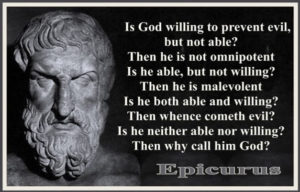 It seems that more and more in modern politics, voters are faced with choosing between the “lesser of two evils.” In such instances, how should a Christian vote? Should we follow the advice of famed Baptist preacher Charles Spurgeon who says that “of two evils, choose neither.” Or, in this case, does the lesser evil represent the greater good?
It seems that more and more in modern politics, voters are faced with choosing between the “lesser of two evils.” In such instances, how should a Christian vote? Should we follow the advice of famed Baptist preacher Charles Spurgeon who says that “of two evils, choose neither.” Or, in this case, does the lesser evil represent the greater good?
Category Archives: Tough Questions
Articles that answer difficult questions about Christian belief that both Christians and non-Christians often ask
Are Right and Wrong Actually Right and Wrong?
America is increasingly embracing “Moral Relativism.” This philosophy is the belief that moral judgments are only true or false in relation to subjective standards like culture, tradition, or individual preference, and that no standard is inherently better than another. This is contrasted to “Moral Absolutism” which contends that there are absolute, objective standards of morality and that certain actions are always right or wrong, regardless of the circumstances or context. Continue reading
The “Hiddenness” of God
In addition to the “Problem of Evil,” one of the most common objections to the Christian faith is the supposed “hiddenness” of God. If God is real, and desires a relationship with mankind, why is He not more evident? Why can we not see clear, compelling evidence of His existence so that everyone will follow Him? As famed atheist Bertrand Russell reportedly remarked when asked what he would say to God to justify his unbelief if they met in the afterlife: “God, you gave us insufficient evidence.”1 Continue reading
The Problem of Evil
 The “Problem of Evil” is one of the biggest philosophical challenges to a belief in God and is a major contributor to the rejection of Christianity. In fact, well-known biblical scholar and critic Bart Ehrman credits the problem of evil with his own loss of faith. We’ve addressed this topic in an earlier article, but a more comprehensive response is appropriate. The problem can be simply stated as follows:
The “Problem of Evil” is one of the biggest philosophical challenges to a belief in God and is a major contributor to the rejection of Christianity. In fact, well-known biblical scholar and critic Bart Ehrman credits the problem of evil with his own loss of faith. We’ve addressed this topic in an earlier article, but a more comprehensive response is appropriate. The problem can be simply stated as follows:
- If God is all-good, He would want to destroy evil
- If God is all-powerful, He could destroy evil
- Evil exists
- Therefore, an all-good, all-powerful God does not exist
The logic seems sound on the surface. But can these really be our only options? Clearly, the problem of evil presents believers with a dilemma. Or does it? Continue reading
How Could God Become a Man?
Christmas is the time of year when Christians celebrate the birth of Jesus, who they believe is the Messiah (or savior, literally “anointed one”) predicted in the Old Testament. According to Christian orthodoxy, Jesus is actually God incarnate. The doctrine of God becoming human is very clear throughout both the Old and New Testaments (e.g. Isaiah 9:6, Isaiah 7:14, John 1:1-3, John 1:14, Colossians 2:9, Hebrews 1:3, John 20:28).
Many non-Christians question how or if God could become a man. They have many good questions related to this such as: How is it possible for an infinite God to become a finite person? How can God be two people at the same time? Did He stop being God while He was a man? Why would God do this in the first place? As we approach Christmas, it is appropriate to reflect on these questions and “always be prepared to give an answer” to those who may ask why we believe what we do (1 Peter 3:15). Continue reading
“How can Jesus be the only way to salvation?”
 As we covered in another article, it is popular today to believe that multiple religions offer equal access to God. Consequently, many people question whether Christianity can really be the only way to experience salvation. Christians are often thought of as narrow-minded or self-righteous for believing that their religion is the only “right one.”
As we covered in another article, it is popular today to believe that multiple religions offer equal access to God. Consequently, many people question whether Christianity can really be the only way to experience salvation. Christians are often thought of as narrow-minded or self-righteous for believing that their religion is the only “right one.”
Ultimately, “Is Jesus the only way to salvation?” is a very important question that Christians and non-Christians should ask. But how should we go about finding the right answer? Continue reading
“Can God Make a Mountain So Big He Can’t Lift It?”
 Questions like “Can God make a mountain so big He can’t lift it” are sometimes used as an attempt to discredit the idea of an omnipotent God. They attempt to show that the very idea of some all-powerful entity is logically contradictory and therefore, God doesn’t exist. However, these questions misunderstand both the meaning of omnipotence and the nature of God. Continue reading
Questions like “Can God make a mountain so big He can’t lift it” are sometimes used as an attempt to discredit the idea of an omnipotent God. They attempt to show that the very idea of some all-powerful entity is logically contradictory and therefore, God doesn’t exist. However, these questions misunderstand both the meaning of omnipotence and the nature of God. Continue reading
Aren’t All Religions the Same? (Easter Edition)
As we approach Easter, Christianity’s holiest day, it is natural to wonder if faith in “the risen Christ” represents the only way to have a true relationship with God. In fact, it is increasingly accepted in modern culture that all religions are equally valid or that there is “one god, but many paths.” However, is this premise true? Can other religions provide equally valid ways of knowing God?
To address these questions, we will limit this post to the primary world religions. There are several practical reasons for this limitation. First, it is for simplicity’s sake, given the thousands of religions and philosophies that could be evaluated. Secondly, it is reasonable to assume that if God has revealed Himself, He has done it in an effective way that has attracted many believers. So under this pretext, we will evaluate Christianity, Judaism, Islam, Buddhism, and Hinduism since they are generally considered the world’s most prevalent and influential faiths. Continue reading
Judge Not…
 In previous articles, we discussed how our behaviors and attitudes interact with salvation, and what God expects from us in these areas. We also briefly mentioned how today’s culture doesn’t always accept these values and is quick to call Christians old-fashioned, close minded, or judgmental when they advocate for God’s standards. All too often, some people attempt to silence Christians from espousing biblical ethics by quoting “Judge not, so that you will not be judged” from Matthew 7. Continue reading
In previous articles, we discussed how our behaviors and attitudes interact with salvation, and what God expects from us in these areas. We also briefly mentioned how today’s culture doesn’t always accept these values and is quick to call Christians old-fashioned, close minded, or judgmental when they advocate for God’s standards. All too often, some people attempt to silence Christians from espousing biblical ethics by quoting “Judge not, so that you will not be judged” from Matthew 7. Continue reading
How Should A Christian Act?
 In a previous article, we discussed how works result from, rather than in, a person’s salvation. Now we turn our attention to what those works should be. The Bible states that as Christians, we are Christ’s representatives (2 Corinthians 5:20) and are called to do good works (Ephesians 2:10). The question naturally arises “what should this look like?” Our purpose in this article is to give an overview of how God expects Christians to be and act, as articulated in scripture. This is not an exhaustive analysis, but rather a starting point for self-examination and further study. Continue reading
In a previous article, we discussed how works result from, rather than in, a person’s salvation. Now we turn our attention to what those works should be. The Bible states that as Christians, we are Christ’s representatives (2 Corinthians 5:20) and are called to do good works (Ephesians 2:10). The question naturally arises “what should this look like?” Our purpose in this article is to give an overview of how God expects Christians to be and act, as articulated in scripture. This is not an exhaustive analysis, but rather a starting point for self-examination and further study. Continue reading




